

Effectively, this is a way of being able to use a private key without having to decrypt it manually every single time, but without the decrypted private key ever existing on disk. SSH clients then contact the SSH agent to complete authentication attempts the SSH agent will digitally sign the authentication requests using the appropriate key but will not divulge the private key.
#Putty ssh authentication agent password
The idea is that you add your private keys to a local SSH agent (and type the decryption password in once), with the SSH agent holding them in memory. The solution that is generally adopted is the use of SSH agents, which offer a compromise between convenience and security risk, and are a little bit like a trusted third party. One recommended option is to encrypt the private key with a password, reducing the impact of theft of the encrypted private key, but the problem is user experience we are now back to having to type in a password for every SSH connection (albeit to decrypt the private key instead of logging in to the SSH server directly). However, this would in the traditional sense involve a decrypted private key existing on your computer, meaning that anyone who gained access to this file would be able to use it to log in to any system for which the corresponding public key is trusted. It is also painful for repeated connections, such as repository commits or multiple connections to different systems.Ī widely accepted alternative is to use publickey authentication, which does not require passwords and is superior from both a user experience and cryptography perspective. This is generally inconvenient, vulnerable to key logging, susceptible to the fact that users do not always choose strong passwords and often share passwords across different systems, and all of the other issues that any penetration tester will have come across. When connecting to an SSH server using traditional password authentication, users need to enter a username and a password. However, with any system of this nature, there is still the question of user experience when authenticating. SSH solves a very large number of security problems and there is not a widely supported mainstream alternative to it. There are a number of very good guides on the internet that cover the internal mechanics, cryptography and maths of publickey authentication and I would recommend reading those if you have an interest in the detail. Password authentication is very well understood, but there is a strong focus on publickey authentication instead of password authentication much like SSL client certificate authentication, publickey authentication is resistant to attempts to disclose a shared secret (a password) using man-in-the-middle attacks and, with the integration of SSH agents, can be used to offer rlogin-style passwordless authentication for user convenience, whilst retaining all of the cryptographic benefits of SSH. There are two widely used methods of authenticating with an SSH server regardless of the purpose of the connection these are password and publickey. The notable SSH clients and servers are so versatile and offer additional features, such as TCP port forwarding, creation of SOCKS proxies, can channel multiple SSH connections over a single link and, with a little extra configuration, functional VPNs can be configured all with the cryptographic strength and performance offered by SSH. It is usually sensibly recommended that management of appliances, devices or hosts running some flavour of UNIX is performed over SSH.
#Putty ssh authentication agent code
These days, SSH has a multitude of uses even modern code repository tools such as subversion, mercurial and git all support and recommend the use of SSH to manipulate repositories. The weaknesses of telnet are widely understood and many vulnerability scanners consider the opportunity to gain management access to a device using telnet to be a high risk issue, perhaps because of the ease of which traffic can be interception and the fact that SSH can be dropped in as a replacement. Every penetration tester has at some point come across a host which accepts telnet connections, probably on TCP port 23, and included a paragraph in the report covering the benefits of using SSH as an alternative.


 0 kommentar(er)
0 kommentar(er)
